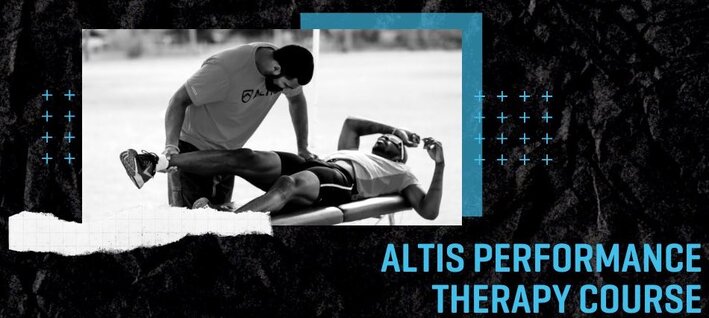"The best practitioners work across disciplines, but they have expert-level understanding of more than one specialist discipline, and at least basic understanding of the whole of the performance ecosystem in its entirety." While this very brief review is not intended to summarize the course itself, my aim for this write up is to provide some personal thoughts derived from working my way through this expansive resource. At the time of writing this post, approximately one year had passed since first registering for the ALTIS Performance Therapy Course (PTC). I had been away at a training camp upon its release so had some downtime in between training and therapy each day to voraciously "consume" the first few sections. About one-third of my way through however, it became apparent that the comprehensiveness of this online course was greater than I had expected and it was evident that I would only be doing myself a disservice if I didn't return back to the beginning and take my time to slowly "digest" the information. This course was everything I didn't expect it to be but exactly what I needed it to be. Divided into three books - Philosophy, Science, and Art - the Performance Therapy Course renders an introspective approach uncommonly seen today. With the breath of its chapters and the depths of each, its similarity to graduate-level theses is more than apparent. Book 1 - "Philosophy" in my opinion, should be standard for all of ALTIS' online courses. It is heavy and in a way, it is exhausting. It doesn't teach you how to think, but more importantly, it makes you think about how you think. Throughout the entire course, relevant resources and references are exponential yet easy to access. In a positive way, this affords the student/learner the opportunity to toggle back and forth between research articles, expert lectures and guest interviews and relate them back in context to the specific topic being studied. Unfortunately (or fortunately) however, what results is a "rabbit hole" of sorts that leads one to places far removed from, yet still extremely relevant to, the original subject. The amount of material that I have saved, printed and bookmarked from this course that I will need to revisit will keep me busy for at least another six months. It should be noted that this is not a course for those looking to enhance their therapeutic skills in a traditional sense. That is, if you are looking for a course to teach you specifically how to assess osteoarticular (joint) mechanics, manipulate soft tissue, and/or program strength interventions, then you will need to look at other resources. This course is also not one that will provide the reader with specific protocols to assess movement. The amount of courses that cover each of the above are already numerous. What this course will most likely provide the student with however, is a re-evaluation of one's own framework for working with athletes and hopefully, some scaffolding and guidance for approaching problem identification and management. As stated in Mark Sandborn's Fred Factor, "To know more, notice more." Finally, completion of the PTC provides a little more context to who ALTIS has brought in as guest speakers for their Apprentice Coach Programs and why, such that future searches with the ALTIS 360 content become much more strategic. In the current, modern day space of dynamic abundance, our interventions and our learning alike need to be less resembling of "whack-a-mole" and more problem-based and ecologically-relevant. Therefore, it is my opinion that this resource is a must for those with (or eager to possess) a multi-dimensional mindset, regardless of whether they are a therapist, coach, reconditioning specialists and/or applied sport scientist.
0 Comments
Leave a Reply. |
